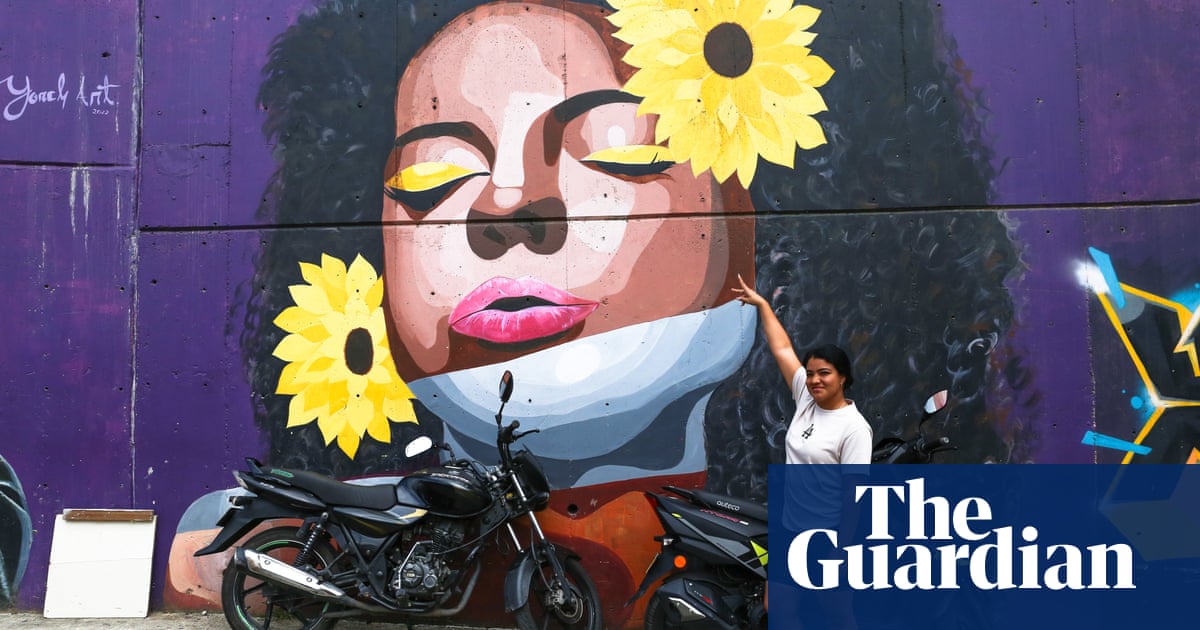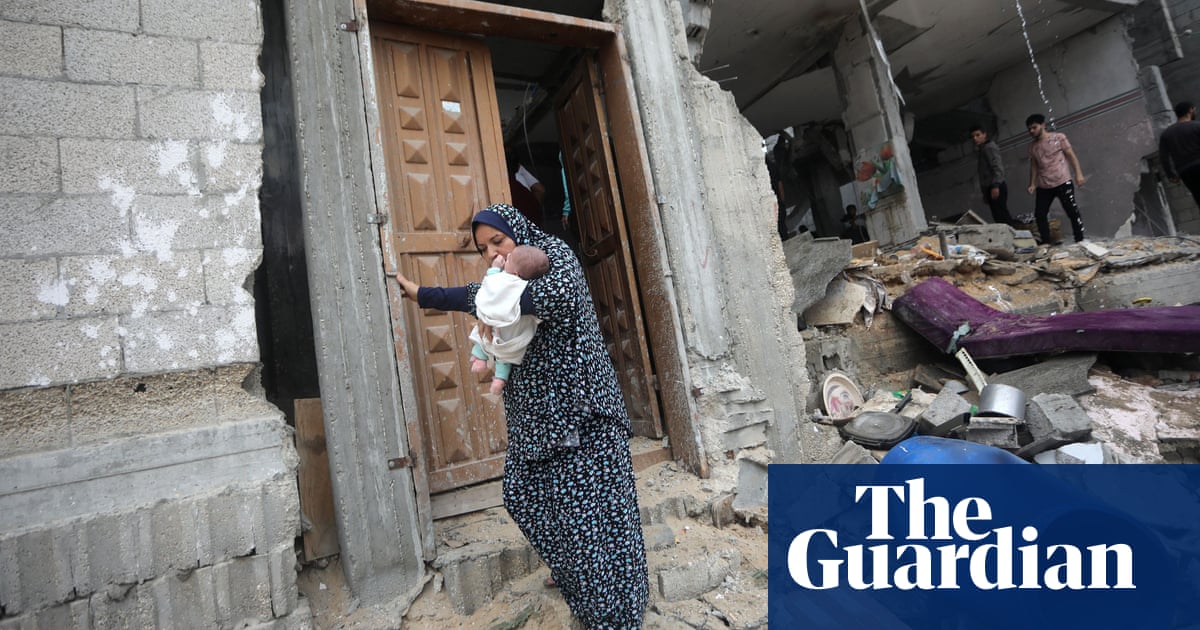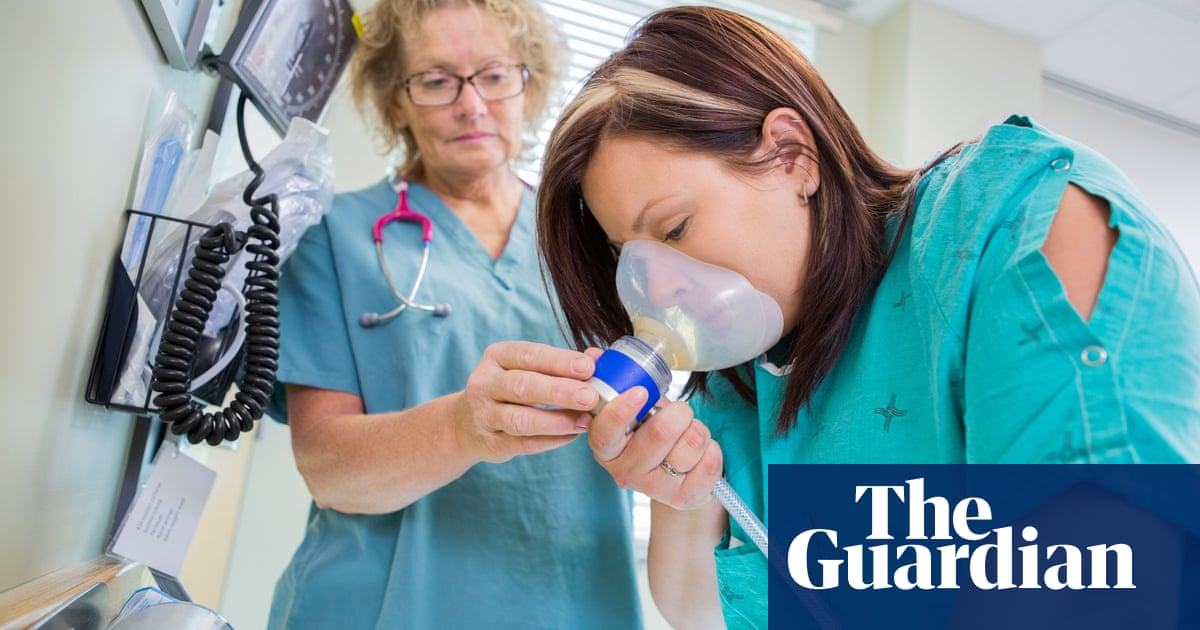
n the morning of 3 May, Victoria Johnson prepared to give birth at her home in the Highlands. One by one, her three children came downstairs to where she was labouring in a birthing pool surrounded by fairy lights, the curtains tightly shut against the outside world.
Suddenly, she felt an urge to get out of the pool. “I stood up and it felt as if the weight of the universe crashed from my head to my toes.” Her waters broke – “all over the carpet, which wasn’t ideal” – and the baby started to crown. “Everyone was there, including both grandmothers on video call,” she says. “Once the baby was out, my eight-year-old son came over and said, ‘I’m so proud of you.’ And that was everything.”
There was no midwife present. Instead Johnson and her husband had hired a doula, who offers emotional support and guidance but is not medically trained. It was only after the placenta was delivered, and carefully placed in a bowl, that a midwife was called to check their baby boy.
For Johnson, a freebirth – typically characterised as a birth without medical assistance, through choice rather than circumstance – was an empowering and positive experience. But it had been preceded by an exhausting battle with health authorities that has been the hallmark of many women’s experience of pregnancy during the pandemic. In March, as the infection rate spiralled, trusts across the UK withdrew home birth services, while others closed midwife-led birth centres. Staff shortages and a high volume of 999 calls had put enormous pressure on the system. Hospitals rushed out new rules on birth partners, who were excluded from scans and sometimes even the birth itself. Between 9 March and 9 April, there were 14 different sets of official national advice for pregnant women in the UK. This year, giving birth in hospital has often felt like a confusing, risky and lonely prospect.
The mother of children aged eight, five and three, Johnson had planned a home birth for her fourth baby after a traumatic birth experience in hospital. “I knew if I went to hospital I’d shut down and end up having a C-section,” she explains. But 35 weeks into her pregnancy, home birth services in her area were suspended.
Sent into a tailspin of anxiety, Johnson wrote to her MSP, and attempted to register in a neighbouring council, where home births were still on offer. Neither was able to help. She found an independent midwife willing to assist her – but it would have meant travelling hundreds of miles south.
Born and raised in New Jersey, Johnson had told American friends the NHS was one of the main reasons she moved to Scotland. Now, feeling let down, she joined an emerging demographic of women who this year settled on a freebirth – not as their first choice, but because it seemed the best option available.
***
It is hard to know exactly how many babies are born by freebirth in the UK every year, but research out this month points to an increase in the number of people shunning medical assistance as a result of Covid-19 restrictions. In April, researchers at King’s College London surveyed 1,754 women – aged between 19 and 41, and from across the UK – who were either pregnant or had given birth since the beginning of lockdown, with striking findings. Of the 1,418 still pregnant in April, one in 20 (5%) were considering a freebirth; only one of these had been planning that before the pandemic. “It is a really high figure,” says Dr Mari Greenfield, co-author of the study, “especially in the context of how many women have a home birth each year” – around 2% of women in England and Wales, according to the Office for National Statistics.
The reasons given were complex, Greenfield says. “There was rarely one – issues such as childcare and transport came into play.” A desire to avoid going into hospital was a reason given by 39 participants. For many, this was due to a previous bad experience; for others, it was because they felt hospitals had become places of danger and contamination. And for a number of women, opting for a freebirth was not a positive choice: while 16 respondents described it as an empowering decision, 26 said they felt forced into it.
The fact that many trusts were allowing birth partners in only during “established labour” was another key concern. One respondent told King’s College researchers: “My partner is a great support: we have gone through IVF and a miscarriage together, and I couldn’t imagine doing this without him.” A single mother was worried there was no one to look after her other children: “Home births are still going ahead in my trust, but I wouldn’t be allowed my doula or kids in the room. I have no childcare and no other birth partner.”
A theme that ran throughout was safety – of the woman, her baby and the wider family. “This is interesting given the characterisation of freebirth as an inherently unsafe choice,” says Greenfield, who points to a number of medics among the cohort: the first time, she says, that a UK study has shown NHS healthcare professionals contemplating stepping outside it to freebirth. One senior hospital-based healthcare professional told the study she made her decision after home births were cancelled, and she was told she was ineligible for a midwife-led unit because her BMI was too high.
In Greenfield’s view, the study has exposed tensions that preceded the crisis, and the view of some that maternity policies can be coercive. “Covid-19 has placed a spotlight on existing problems,” she says. “When pregnant people are presented with a service they deem to be unsafe, or that does not align with their needs, they will step outside that system. What we may find is a more long-term shift towards greater numbers of women seeking to give birth in out-of-hospital settings.”
How real is the perceived risk of infection during the pandemic? While there have been confirmed cases of Covid-19 on maternity wards, it is not clear that these have led to wider outbreaks. Dr Patrick O’Brien, vice-president of the Royal College of Obstetricians & Gynaecologists, says maternity units are “a very safe place for pregnant women and their babies. We know the pandemic has made many parents very anxious [but] the risk of a woman catching this virus in a maternity hospital is very low indeed.” Most units test for the virus at the time of an unplanned admission, and beforehand for inductions or caesareans. Maternity staff are tested regularly and wear personal protective equipment at all times.
Meanwhile, freebirthing, though legal, carries obvious risks. While most births are uncomplicated, in some situations the immediate care of a qualified midwife or obstetrician could be life-saving. “When a complication occurs, such as heavy bleeding after birth, the presence of a midwife may be critical,” O’Brien says. Every woman should be supported in her birth choice, he adds, but “it’s important they are made aware of the risks and benefits of giving birth in different settings”.
***
The crisis facing independent midwifery is a crucial part of this jigsaw. Independent midwives are self-employed, and hired by women who find the NHS cannot support their preferred birth plan. But in June, following the twin shocks of Brexit and Covid-19, the US company that provided their insurance withdrew it, meaning they are not legally permitted to assist in childbirth.
Midwife Jacqui Tomkins, who is also chair of Independent Midwives UK, used to take two calls a week. “Suddenly, during [the first] lockdown, it rose to 20, and it was the same across the country,” she says. “Women were terrified after their home births had been cancelled and felt they had no option but to go it alone. Since the second wave, the calls have been mounting again.”
There are an estimated 150 registered independent midwives in the UK who, prior to the insurance crisis, were supporting around 2,500 women a year. “The irony is we are getting more requests than ever,” Tomkins says. “Our hands are tied when we are needed most. This is really hurting our members emotionally; many are slipping into poverty.”
Beatrice Cianchi tried to hire an independent midwife earlier this year, after her home birth in London was cancelled on 30 March, three days before her due date. “But the fee was £4,000, and I couldn’t afford it.”
Cianchi, 32, had suffered postnatal depression following the birth of her son, Arjuna, now four. “The birth was highly medicalised. I was induced with very high doses of oxytocin and felt completely powerless.” She has few memories of her first five months as a mother. “I’d wake up each day thinking, I could be dead now and who would care? I had therapy, but it took a long time to recover.”
Her second pregnancy had been going smoothly until her family in Italy went into lockdown in early March. “I started feeling incredibly anxious and had a panic attack in front of my midwife, who reassured me, saying: ‘Don’t worry, we won’t leave you alone.’”
Yet that is exactly what happened after home birth services were withdrawn. “I felt totally abandoned,” Cianchi says. “They knew what I’d been through, so how could they do this to me? A home birth is a right, not a privilege.”
Giving birth at home this time around was, for Cianchi, imperative. She started researching unassisted birth. “When I told my midwife, she wanted to help but the hospital wouldn’t back her,” she says. Instead, she turned to a doula, who agreed to attend the birth but insisted she could provide only emotional support. In the early hours of 11 April, Cianchi’s waters broke. “We lit candles and my partner Silvio held the shower on my back for pain relief. We rang the doula and she arrived 30 minutes before my son was born. Afterwards, I was high as a kite and felt a deep joy – I couldn’t believe we’d done it.”
After Arjuna’s birth, she had refused to see anyone. “This time, I wanted to show everybody what I’d done, but I couldn’t because of lockdown. I saw a different side to my partner – he knew what to do and didn’t doubt me for a second. If the first birth tore us apart, this one united us.”
That elation was tempered after speaking to their local hospital. “We called them because I was worried I might have a tear. They said what we had done was illegal and that they were going to send an ambulance. But we didn’t want that.” Instead, they were visited by a sympathetic midwife who assessed baby Juniper, now seven months old.
“She reassured us we had made the right decision,” Cianchi says. Still, she warns against women being pushed into freebirthing because their other options have been removed. “Women should be aware of what could go wrong and willing to get assistance if they need it.”
***
Alison Edwards of Doula UK, whose 700 members advocate for expectant mothers, says there was a threefold increase in calls about freebirthing between March and June. Meanwhile, Wales-based doula Samantha Gadsden set up a nominal fee-based Facebook group on freebirthing in March, because she was getting so many inquiries. It now has nearly 300 members and numbers spiked again following the second lockdown. “People were getting nervous, because they knew home births were cancelled before,” she says. Membership of her other Facebook group, Home Birth Support Group UK, has more than doubled since March, from 2,700 to 6,390.
Gadsden, who insists she does not advocate for any particular type of birth, says her members have felt unsupported in their decisions. “There are pockets of excellence, but what I’m hearing more and more is that women are being coerced and disrespected.”
Some parents choosing to freebirth have been threatened with referral to children’s services, even though they are not breaking the law. “It appears many maternity staff are not aware that women have a legal right to freebirth,” says Nadia Higson of the Association for Improvements in the Maternity Services. On 30 April, in response to reports that some women were removing themselves entirely from NHS perinatal care because of a reduction in birthplace options, the Royal College of Midwives issued guidance to members on how to support women. This made clear that it was not appropriate to refer a woman to children’s services solely because of her decision to decline medical support. “Despite this, we continue to hear reports of women being threatened,” Higson says. “It causes huge anxiety for couples. While common sense usually prevails, we do hear of some families being monitored.”
Julie Frohlich, a London-based NHS consultant midwife with more than 35 years’ experience, says she is saddened that some women freebirth because they don’t trust healthcare professionals. “We should be supporting women’s informed choices, but too often we are trying to get a woman’s informed compliance.” She believes fear of what could go wrong can be used to direct women into decisions that aren’t right for them. “Clinicians often seem to feel it would be their responsibility if a woman were to make a choice they didn’t approve of. It’s not our role to approve a woman’s informed choice, but to facilitate it. Women labour best when they feel comfortable and safe. They know things can go wrong – there is rarely zero risk. But one woman’s high risk is another woman’s low risk, and we must respect that.”
Meanwhile, NHS England has dismissed the findings of the King’s College study, claiming it shows only women’s intentions rather than what they went on to do. A spokesperson said: “Home births are now available in 98% of trusts, and NHS guidance has been clear throughout the pandemic that mothers can be accompanied by their partners for childbirth.” But trusts issue their own policies when it comes to birth partners, and access varies.
***
Zoe Kimpton has twice been reported to social services for freebirthing, most recently following the arrival of her eighth child, Arthur, in October. “He was a wild card and I was nervous from the moment I found out I was pregnant,” she says.
When she was 35 weeks pregnant with Arthur’s brother, now 15 months, her lung collapsed and she had an elective caesarean in hospital. Her first three children had been born in hospital, followed by a home birth and two freebirths. But Kimpton didn’t want to take any risks with her seventh child. “I wasn’t going to jeopardise my health or his,” she says. “That birth was beautiful in its own way, because as I lay there in theatre I was so grateful he hadn’t been harmed by my health issue.”
But when Kimpton, now 40, became pregnant with Arthur, there was a new factor: Covid-19. “After my lung collapse, I would have liked NHS input at my birth. But I didn’t want to be shunted around a hospital knowing Covid-19 attacks the respiratory system. It was a scary decision. I was worried home birth services could be cancelled at any time.” She decided her safest option was to freebirth with the support of her husband, and call for help if needed.
In the end, Arthur’s birth was straightforward. “I leant up against the sofa and laboured,” Kimpton says, “then I got in the pool. The kids were coming up, kissing me and playing with glowsticks in the water. My husband was very supportive, and his aunt popped in now and again with fruit for the children.”
But after the birth, Kimpton was losing a lot of blood. She was transferred to hospital, where she underwent surgery for a retained placenta. “It would have happened wherever I was,” she says. “But afterwards a doctor, with a herd of students, came and reprimanded me. Later I learned that while I’d been in theatre, someone was calling social services. The midwife was apologetic – it was the hospital’s policy – but I felt deeply offended.”
Kimpton, who volunteers as a bereavement group coordinator, believes in the importance of being able to make our own decisions about both birth and death. “I pioneer for a gentle birth, but also for a gentle end of life. These are big decisions we should all be free to make as individuals.”
Even for women who have had a positive birth experience in the past nine months, navigating the challenges brought about by Covid-19 may have a lasting effect. A recent survey of 15,000 pregnant women and new mothers by the UK charity Pregnant Then Screwed found 90% of respondents said hospital restrictions were having a negative impact on their mental health. An open letter from 34 MPs and campaigners sent last month to the NHS stated, “The long-term impact of these restrictions for new mothers and their families could be catastrophic.”
According to Maria Booker of Birthrights, “Trust has been lost during this pandemic and maternity services must now work hard to rebuild that. We are still getting lots of reports from women affected by restrictions around birth partners. And while most home birth services are back up and running, there are concerns these could be put at risk again if maternity staff are hit by Covid-19.” A Royal College of Midwives survey published last month revealed that 75% of midwives think staffing levels in their NHS trust are unsafe.
Six months after the birth of her son, Victoria Johnson is still angry at the weeks she lost to anguish over her birth plan. “I don’t get back that month of soul-searching,” she says. “It was dehumanising from start to finish. When it comes to women’s birth rights, there is a massive demographic being left behind. We do not have sovereignty over our own bodies.”












